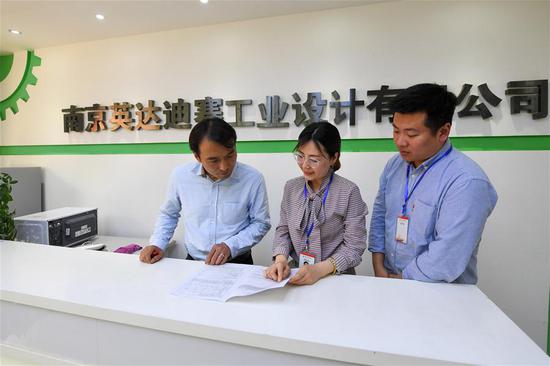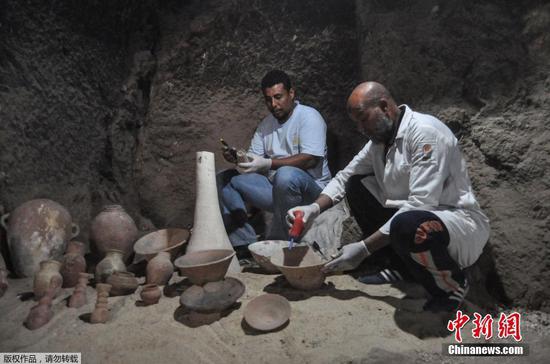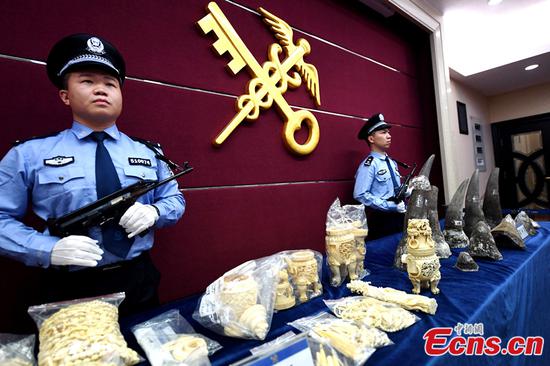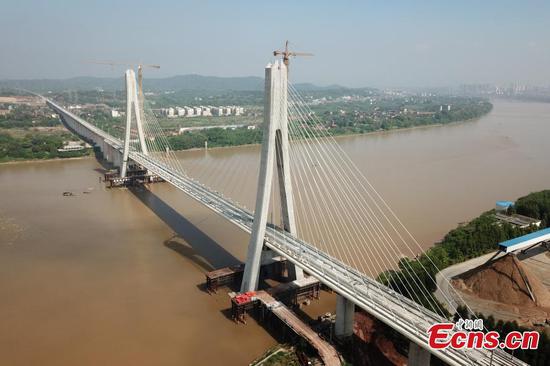
Statistician Wang Ting (C) explains a registration form for Cina's fourth economic census to staff members of a company in Nanjing, capital of east China's Jiangsu province, April 8, 2019. (Xinhua/Li Bo)
Statistician Wang Ting has spent nearly four months visiting businesses and collecting data on their operation, so is well placed to sense the changes in China's economy.
Carrying a hand-held computer device, the 35-year-old from the statistic department of Nanjing in east China's Jiangsu province, is conducting the country's fourth economic census.
In the four months from January, over 2 million census workers across the country like Wang need to survey 30 million entities and industrial units, as well as about 60 million self-employed entrepreneurs.
In the "super economic check-up," census workers said they faced a tougher-than-ever task collecting data on enterprises structure, staff wages, financial status, production capacity, energy consumption, and research and development activities.
HIGHER DATA QUALITY
Ning Jizhe, head of National Bureau of Statistics (NBS), has stressed the need to secure higher data quality. Calling data quality "the life line" of the economic census, he said the top priority of the work was to guarantee data accuracy.
As the Chinese economy is undergoing transformation and upgrading, Zhuang Jian, senior economist with Asian Development Bank, said that accurate and authentic census data was significant for future studies.
To ensure accuracy and efficiency, fresh tools have been employed. Wang said respondents could access the NBS terminal management application and data-checking system through a hand-held computer device.
Previously, census workers had to take down the data they collected first and input to computers later.
"Now we input the information collected in the presence of the respondents and ask for a confirmation signature," Wang said. "Both efficiency and quality of our work is improved."
In the meantime, designated large enterprises in the service sector, with an annual revenue of at least 10 million yuan or over 50 employees, are allowed to fill in the register directly on an NBS website.
Those who refuse to provide the required information or try to manipulate the data will be discredited in the country's credit system, according to the NBS.
NEW FEATURES
Apart from equipping census workers with new tools, the NBS has attempted to make the census more accessible to the public by opening an account on Chinese popular video-sharing app Douyin to share amusing short clips.
Compared with previous economic censuses, the current one pays more attention to the new economy, which tends to be labor- or technology-intensive but asset-light, sustainable, shows rapid growth and is in strategic areas encouraged by the government.
New survey items such as research and development, production capacity, energy consumption and e-commerce sales have been factored in.
"By adding these new items, the census can draw a clearer picture of the new economy while tracking new growth engines," Zhuang said.
During an on-site survey, Wang who participated in the previous economic census, found more small and medium-sized enterprises involved this time, and their business more diversified.
Census workers also feel stronger public involvement. Wang Nan, CEO of ZBJ, an emerging talent-sharing website in China, is looking forward to the census results.
"Companies can better understand industry dynamics and market trends and optimize business decision-making through the data, and individuals can use relevant data as a reference to make smart choices in personal career development and investment," he said.
BETTER GOVERNANCE
In the bigger picture, the census will help provide stronger statistical support for the government to conduct macroeconomic control and roll out long-term plans, according to Zhuang.
For Ning, the ongoing census will help the country to better pursue high-quality development through reform. It will allow the government to better evaluate economic performances, monitor and track the progress.
Upon completion, a database involving all sectors will be established, laying a solid statistical base for macroeconomic control and economic governance.
Statistics will have more say in China's economic governance, policymaking and innovation, Ning noted.


















































